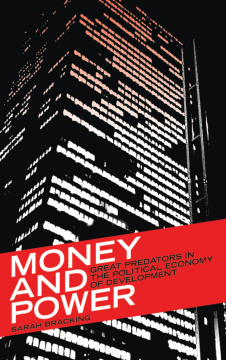
Additional Information
Book Details
Abstract
This book explores the role of governments and financial institutions in managing the markets in the developing world.
These 'Great Predators' are trapping the populations of the Global South in a permanent cycle of austerity. Through a framework of political economy, Money and Power shows how pseudo-public 'development' institutions retain complete economic control over developing markets, while the international system remains unregulated.
Operating in the interests of North America and the European Union, these Great Predators have a political purpose, and yet serve to cloud the brute power relations between states.
'A committed, thoughtful, closely and rigorously-argued work. The most relevant analysis of how money and capitalist power reproduce poverty in today's world'
Professor Alfredo Saad Filho, Head of Department of Development Studies, School of Oriental and African Studies, University of London.
'A clear and trenchant indictment of the view that private capital has the interest and capacity to develop the Global South'
Raymond Bush, Professor in African Studies and Development Politics, University of Leeds
'Delivers important detail about how northern elites and businesses, under the guise of development maintain and promote international inequality'
Raymond Bush, Professor in African Studies and Development Politics,
University of Leeds
'Cutting-edge'
Patrick Bond, Senior Professor, University of KwaZulu-Natal School of Development Studies, Durban, South Africa
'Exposes in elegant detail the economic and political interests that lie behind aid'
Nick Hildyard works with the Corner House, a UK research and solidarity group focusing on human rights, environment and development.
Table of Contents
| Section Title | Page | Action | Price |
|---|---|---|---|
| Cover | Cover | ||
| Contents | vii | ||
| Abbreviations | ix | ||
| Preface | xiii | ||
| 1. The political economy of development | 1 | ||
| Institutions of the global economy | 5 | ||
| Frontier institutions | 7 | ||
| Why is money so important? | 8 | ||
| Institutions matter | 9 | ||
| Chapter plan | 12 | ||
| 2. Money in the political economy of development | 17 | ||
| A short history of development finance | 19 | ||
| From debt crisis to system stability? | 23 | ||
| Debt relief and commercial write-downs | 25 | ||
| Aid: ‘much heat and light and signifying nothing’? | 28 | ||
| The current market for development finance | 29 | ||
| Conclusion | 33 | ||
| 3. Making markets | 35 | ||
| Markets | 35 | ||
| Risk as governing technology | 39 | ||
| Political risk: uncertainty or calculable risk? | 44 | ||
| Sovereign political risk and market makers | 45 | ||
| The International Finance Corporation and sovereign economies | 48 | ||
| Conclusion | 51 | ||
| 4. International development banks and creditor states | 53 | ||
| Good banks or powerful owners? | 56 | ||
| The global Keynesian multiplier | 61 | ||
| Conclusion | 63 | ||
| 5. The British market makers | 66 | ||
| The Commonwealth Development Corporation | 66 | ||
| The Export Credit Guarantee Department | 79 | ||
| Crown Agents | 81 | ||
| Neoliberalism and the frontier institutions | 84 | ||
| Conclusion | 89 | ||
| 6. Poverty in Africa and the history of multilateral aid | 92 | ||
| Contemporary development research and poverty | 95 | ||
| Place, poverty and culture | 96 | ||
| The theoretical contribution of multilateral development assistance | 99 | ||
| A short history of multilateral development finance | 103 | ||
| Conclusion | 109 | ||
| 7. Derivative business and aid-funded accumulation | 111 | ||
| Objectives for development finance | 112 | ||
| Patterns of multilateralism, domestic constituenciesand national shares | 114 | ||
| Derivative business at the Asian Development Bank | 124 | ||
| Derivative business at the African Development Bank | 126 | ||
| Crony networks and closed procurement | 129 | ||
| Conclusion | 137 | ||
| 8. Private sector development and bilateral interventions | 140 | ||
| Benefits of private sector development instruments | 140 | ||
| Assisting accumulation – but development? | 142 | ||
| The European Development Finance Institutions | 147 | ||
| For the common affairs of the European bourgeoisie | 149 | ||
| Conclusion | 156 | ||
| 9. Taking the long view of promoting capitalism | 159 | ||
| Post-colonial disinvestment | 159 | ||
| A review of the fairness of British economic relations overseas | 163 | ||
| Which institutions in Britain are owed debt? | 164 | ||
| Where did the debt come from? | 169 | ||
| Private sector development in action: the British case | 171 | ||
| Conclusion | 178 | ||
| 10. Aid effectiveness: what are we measuring? | 181 | ||
| A big and largely inconclusive debate | 181 | ||
| Translating mainstream research | 185 | ||
| Representation of the poorest | 188 | ||
| A moral case | 190 | ||
| Conclusion | 194 | ||
| 11. Conclusion | 196 | ||
| The current financial crisis | 198 | ||
| The problem of politics | 202 | ||
| A tale of two narratives | 207 | ||
| Where next for the political economy of development? | 210 | ||
| Bibliography | 214 | ||
| Index | 233 |
